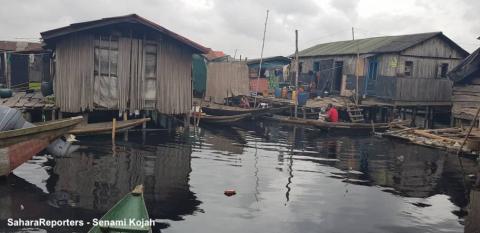
“We used to catch crabs, crayfish, silver catfish (obokun) but most of them are gone now so we survive with what we have. Market is bad because people complain that fish is too expensive, so they go for turkey that they bring from Benin. How can we survive like this?” he queried.
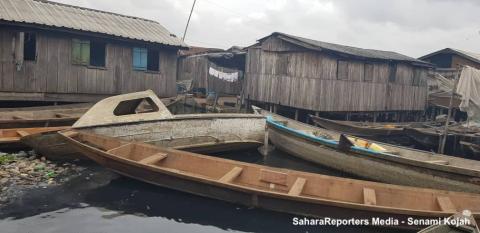
Abandoned fishing boats, the unmistakable stench of stale fish, refuse and government abandonment envelop Nigeria’s biggest water slum in Lagos, Makoko, as residents go about their daily activities navigating the pile in their wooden boats, unaware of the global phenomenon that is about to change their life as they know it.
“Recently, because of the population of the people in the community now, the fishes are lesser than before. Fish is scarce now so anyone we get, we add the price and sell in the market at very expensive rates," says Opeyemi Peters, a paddle-boat operator in Makoko.

What Opeyemi ascribes to the growing population in the stilted slum that houses about 85,000 people is however the effect of climate change, causing rising water temperatures and water acidification, both radically altering the aquatic ecosystem and causing a modification of fish distribution, making marine and freshwater species disappear.
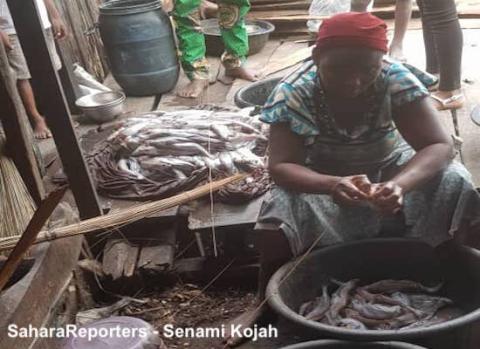
According to Climate Central, fish struggle in warmer water due to the amount of dissolved oxygen in the waterdrops, as the water warms causing fish to become less active and decline because of physical stress.

Sewedo Oviyon, a local fisherman who sat on a makeshift wooden veranda, describes the phenomenon and its impact on his life and those of other fishermen in Oko-Agbon community, Makoko:
“We used to catch crabs, crayfish, silver catfish (obokun) but most of them are gone now so we survive with what we have. Market is bad because people complain that fish is too expensive, so they go for turkey that they bring from Benin. How can we survive like this?” he queried.
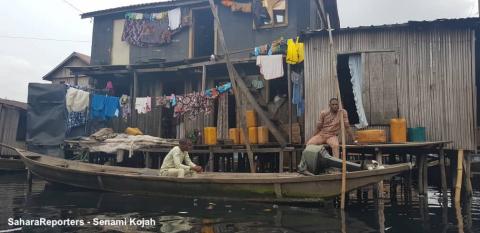
In Nigeria, fishing contributes about 3.00-5.00% of the agriculture share to the Gross Domestic Product (GDP). Decreasing fish populations in Nigeria’s open waters means yearly local demand for fish, which is estimated at 1.050 million metric tons, will now rely upon imports.
From 2006 to 2010, the National Bureau of Statistics (NBS) estimates that Nigeria spent an annual average of N113,63 billion on fish imports into the country due to declining local production.
Nigeria, filled with oceans and lakes (man-made and natural), is considered the largest importer of fish in the developing world. This means a loss of local and endemic marine wildlife as well as the loss of jobs and livelihood for artisanal fishermen who are at the frontline of the impact of climate change.
Baale Gbesemido Daniel Hungbeji, the local chief of Oko-Abgon, Makoko, explains: “Before there were not of people living here at the waterfront but now a lot of people live here and those who want to fish as well have increased, so now we catch only small fishes but we cannot complain and we thank God.
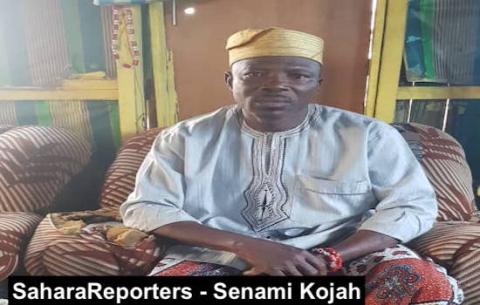
“We don’t get as many species as before — our main issue is the population now — there are more people than there are fishes. Everything is expensive in the market and because we get fewer fishes we also have to inflate the price so that we can survive.”
Makoko, which is inhabited by largely Egun people from Badagry and Republic of Benin, was invaded in 2012 and parts of it demolished by the Lagos State government.
Idowu OmoOpe Time, a young photographer, is one of the victims of the forced demolitions. He travelled from the Republic of Benin as a child to Lagos to fish but has since abandoned fishing for a more lucrative gig.
“When everything fell apart, I learned how to be a photographer. Now I get gigs outside the slum and I go to do them. The sales are low here because people don’t have enough money. But when I go out, I get paid a lot.
“I hope to build a house, marry a wife, do other things as things change for me. I want to leave here, I don’t want to go back to school because my first education was in French and I don’t want to learn English.”

Smelly Tides
Climate activist, Boro Horsefall, has been working with the Makoko community for five years to sensitize the people on climate change.
“It is difficult to open their eyes to see what is going on because this is how their forefathers were sustained and so they cannot understand why things are changing so quickly for them and they are losing fishes,” he says of the experience.

“Education is another factor. Before the floating school and other initiatives here in Makoko, many were not educated as a result of government neglect; in fact, they were not captured in the last census.
“So, telling a local fisherman about overfishing and carbon footprint is difficult. I do my best to tell them to dispose of waste properly and we collect some too when we can. I tell them, the fishes choke on plastic and this can make them run away; they believe me, but sometimes they don’t.
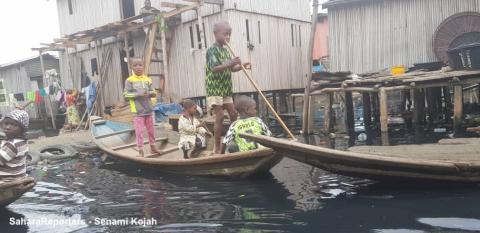
“I call on the government to act fast to at least sensitize the people on what is happening in the most basic terms. These people vote but they will soon all be driven into mass poverty and no one is paying attention.”
Efforts made to reach the Lagos State Environment Protection Agency (LASEPA) to comment on what the state government is doing to sensitize residents of Makoko community on climate change were unsuccessful.
